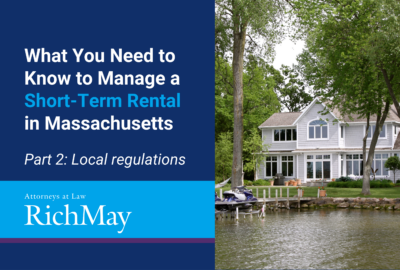What You Need to Know to Manage a Short-Term Rental in Massachusetts – Local Level Regulation
In our earlier article on operating a short-term rental in Massachusetts, we covered the definition of short-term rentals and the relevant state-level regulations, which focus heavily on taxation and liability insurance. In this article, we will discuss local-level regulations, which can vary significantly from one municipality to another.
“Location, Location, Location”
This familiar real estate broker’s refrain is also of relevance here. Besides the state, local municipalities also have the authority to regulate short-term rentals under their zoning powers, including issues relating to licensing and registration, health and safety, and other matters directly related to short-term rentals. While market analysis is critical, when doing due diligence before acquiring a property for short-term rentals or converting an existing property for short-term rental (whether full time or part time), the owner/operator must familiarize themselves with the local zoning ordinances, both the short-term rental ordinance (if enacted) and the zoning bylaw more generally.
Zoning Ordinances.
Zoning ordinances can vary considerably from one locality to another. For example, in cities like Quincy, properties are divided into different districts, where short-term rentals are allowed in some but restricted in others. In Boston, short-term rental use is generally allowed, but is prohibited at certain types of properties, for example, (1) units designated as below market rate or income-restricted, (2) units subject to laws prohibiting leasing or subleasing, (3) units located within properties designated as “problem properties” or “public nuisance properties,” and (4) units with multiple violations within a six-month period.
If your property is zoned for short-term rental use, you have the right to operate a short-term rental “by right,” assuming other requirements are satisfied (see Part I for state requirements). But the zoning analysis does not end there. You should make sure the building meets the dimensional requirements of the zoning code and check for specific regulations regarding the scope of your ability to operate a short-term rental, including the types of hosting, density, and guest frequency. There may also be health and safety requirements, including regarding fire extinguishers, sprinklers, and egress. Even if you have a “by right” use, you still may be required to file applications with the local building authority or seek a special permit with a local planning board.
Appeals.
If your property is not currently authorized for short-term rentals under the zoning code, or if the zoning code does not mention short-term rentals, many municipalities take the position that such use is automatically presumed to be disallowed. That’s not necessarily the end. Most zoning ordinances allow an appeal process through the local Zoning Board of Appeal (“ZBA”) for a special permit, variance, or to demonstrate pre-existing non-conforming use to exempt your property from local zoning laws under Mass. Gen. Laws ch. 40A. Each zoning ordinance provides the legal analysis and process for appeal. Note, however, not every city or town allows a variance for otherwise disallowed uses of property, as opposed to matters such as dimensional noncompliance. It is critical in these situations to engage with an attorney, an engineer, and an architect so you can properly proceed through the appeals process.
It is important to note that the City of Boston doesn’t operate under the same zoning statutes as the rest of the Commonwealth of Massachusetts, but the process is similar. In the City of Boston, you apply for your permits through the Boston Inspectional Services Department (ISD). If you receive a denial letter from ISD, which is common, such a letter will outline sections of the local zoning ordinance that would require appeal. From there you will need to engage with the local neighborhood boards and committees for their review, approval and/or comment. After that, you seek your approval from the Boston Zoning Board of Appeal. The additional layer of neighborhood committees and boards (with some locations requiring multiple local boards) is unique to Boston and something to take into consideration when selecting a location.
Even if you are denied by a local ZBA, you have the option to further appeal in state court. At each step of the appeal process, you want to weigh the cost-benefit analysis as this can take time. For those with existing properties generating significant short-term rental income, it might be worth it. But for those looking to acquire properties with an uncertain income stream, the risks will be greater.
Despite the benefits that short-term rentals provide to both owners and renters, running a short-term rental property is not without its challenges. It is beneficial for any short-term rental owner to familiarize themselves with the applicable restrictions and regulations to avoid potential fines and legal issues.
If you have questions about local regulation of short-term rental properties, please feel free to contact David Glod, Jim Heffernan or Yana Zheng.
Disclaimer: This summary is provided for educational and informational purposes only and is not legal advice. Any specific questions about these topics should be directed to attorney(s) David Glod, Jim Heffernan and Yana Zheng.
© 2025 by Rich May, P.C. and David Glod, Jim Heffernan and Yana Zheng. All rights reserved.


